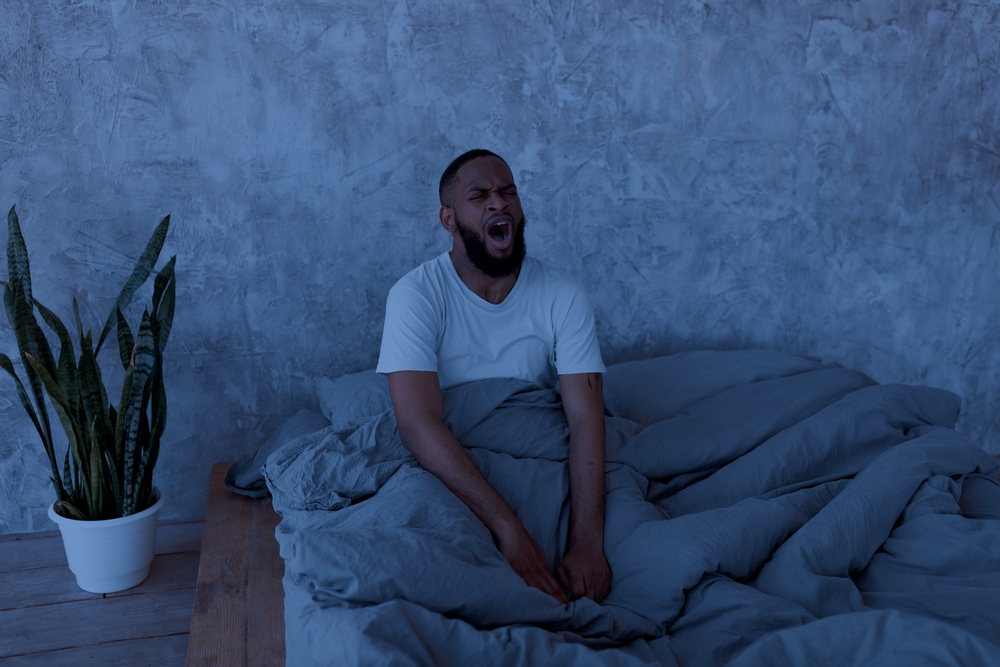Ever notice how after a night of tossing and turning, you suddenly have the willpower of a toddler in a candy store? There you are, bleary-eyed in the morning, making a beeline for the sweetest, most carb-loaded options in sight. That glazed donut you’d normally skip suddenly seems like a reasonable breakfast choice. Your afternoon snack transforms from an apple to a cookie—or three. And somehow, you’re convinced ice cream counts as dinner.
It’s not your imagination, and it’s definitely not a character flaw. This magnetic pull toward sugar when you’re exhausted is the result of a fascinating biological conspiracy happening between your tired brain and your body’s energy systems. Understanding this sleep-sugar connection might finally explain why your healthy eating plans so often crumble after a sleepless night.
The energy emergency your brain declares
The relationship between sleep deprivation and sugar cravings starts with a simple but critical fact: your brain is an energy hog. Despite making up only about 2% of your body weight, it consumes roughly 20% of your daily calories. And it’s incredibly picky about its preferred fuel—glucose.
When you short-change your sleep, your brain essentially declares an energy emergency. Sleep is a crucial restoration period during which your brain replenishes its energy stores. Miss out on those precious hours, and your brain wakes up in a state of resource depletion. It responds to this energy crisis by sending out urgent demands for the quickest fuel available—simple carbohydrates that rapidly convert to glucose.
This isn’t just a matter of feeling tired. Sleep deprivation actually alters your brain’s response to food on a neurological level. Brain imaging studies show that when you’re sleep-deprived, your reward centers light up like Times Square on New Year’s Eve when presented with high-calorie, sugary foods. Meanwhile, the rational decision-making centers of your frontal lobe—the areas responsible for self-control and long-term thinking—show reduced activity.
In other words, your sleep-deprived brain is literally not operating with its full decision-making capacity when it comes to food choices. It’s like trying to make smart financial decisions while someone is waving hundred-dollar bills in your face and your financial advisor has stepped out for coffee.
The hunger hormone rebellion
Beyond these neurological changes, sleep deprivation triggers a full-scale revolt in your hunger-regulating hormones. This hormonal uprising makes sugar cravings nearly impossible to resist through willpower alone.
When you don’t get enough sleep, your body reduces its production of leptin—the hormone responsible for signaling fullness and satisfaction. At the same time, it increases ghrelin—the hormone that triggers hunger. This double-whammy creates the perfect storm for overeating.
But the story gets even more interesting when we look at how sleep affects your endocannabinoid system—the same system targeted by marijuana’s munchie-inducing effects. Sleep loss elevates endocannabinoid levels in your bloodstream, particularly enhancing your enjoyment of sweet, salty, and high-calorie foods. This might explain why that donut tastes exponentially better when you’re exhausted—your brain is literally getting a stronger pleasure signal from it.
Perhaps most devastating to your dietary willpower, sleep deprivation blunts activity in your brain’s insular cortex—the region responsible for integrating physical sensations with emotional awareness. This reduced function makes it harder for you to recognize when you’re full, leading to overconsumption even after your energy needs have been met.
The stress-sugar-sleep triangle
Lack of sleep doesn’t just make you tired—it puts your body in a state of stress. This stress response creates another pathway driving you toward sugary foods.
Sleep deprivation triggers an increase in cortisol, your primary stress hormone. Elevated cortisol has two effects that directly impact sugar cravings. First, it raises your blood sugar to ensure your brain and muscles have readily available energy to deal with whatever threat your body perceives. Then, as blood sugar levels subsequently fall, you experience intensified cravings for quick energy sources—namely, sugar and refined carbs.
This stress response made perfect evolutionary sense when our ancestors needed to outrun predators. The problem is, your body can’t distinguish between the stress of being chased by a lion and the stress of staying up late to finish a presentation. The physiological response is essentially the same, but instead of running for your life, you’re reaching for a candy bar.
The vicious cycle continues because high sugar consumption itself can disrupt sleep quality. Sugar-induced blood glucose spikes and crashes can wake you during the night, reducing your deep sleep and setting you up for more cravings the next day. It’s a self-perpetuating cycle that’s hard to break once it begins.
The willpower drain you can’t overcome
Perhaps the most insidious effect of sleep deprivation is how it depletes your self-control resources. Willpower isn’t just some abstract concept—it’s a cognitive function that requires energy and restoration, much like a muscle.
Sleep is the primary period when your prefrontal cortex—the brain region responsible for self-control, planning, and resisting impulses—recovers from the previous day’s demands. Without adequate sleep, this brain region functions at a significantly reduced capacity.
Research shows that sleep-deprived people not only experience stronger cravings for unhealthy foods but also have less ability to resist those cravings. It’s a double hit—stronger temptation paired with weaker resistance—that creates the perfect conditions for dietary decisions you’d never make when well-rested.
This willpower depletion explains why even the most disciplined health enthusiasts find themselves making uncharacteristic food choices after a poor night’s sleep. It’s not a matter of motivation or commitment—it’s a temporary reduction in the neural resources necessary for self-regulation.
Your body’s misleading energy solution
When you’re exhausted, your body desperately searches for ways to keep you alert and functioning. Sugar presents an appealing quick fix because it rapidly enters your bloodstream and provides an immediate energy boost.
The problem is that this solution is incredibly short-sighted. The initial sugar rush is inevitably followed by a crash that leaves you feeling even more depleted than before. This energy roller coaster drives a cycle of repeated sugar consumption as your body tries to maintain alertness throughout the day.
What’s particularly fascinating is how sleep deprivation alters your sensitivity to glucose. Just one night of poor sleep can reduce your cells’ ability to efficiently use the glucose in your bloodstream—a condition resembling temporary insulin resistance. This means your body needs to produce more insulin to manage the same amount of blood sugar, setting the stage for energy crashes that trigger more cravings.
Your tired brain also becomes particularly susceptible to what scientists call “hedonic eating”—consuming food not for energy needs but purely for pleasure. This type of eating targets the brain’s reward centers and offers a temporary mood boost that can feel especially appealing when you’re dragging through your day on insufficient sleep.
Breaking the sleep-sugar cycle
Understanding the powerful biological forces driving your sugar cravings when sleep-deprived is the first step to breaking this cycle. The good news is that several practical strategies can help you navigate these challenging days without surrendering completely to your sugar-demanding brain.
Prioritize protein first thing in the morning. A protein-rich breakfast helps stabilize your blood sugar and provides lasting energy without the crash that follows sugary breakfast options. Eggs, Greek yogurt, or a protein smoothie can help counter the worst of the cravings before they take hold.
Strategic snacking can help manage the energy crashes that intensify sugar cravings. Keep options like nuts, cheese, or hummus with vegetables readily available. These choices provide more sustained energy than the quick-fix sugar sources your tired brain will naturally gravitate toward.
Hydration plays a surprisingly important role in managing fatigue-induced cravings. Mild dehydration—which often accompanies sleep deprivation—can mimic hunger signals and reduce your cognitive function even further. Keeping a water bottle handy and sipping regularly can help distinguish true hunger from dehydration.
While complete avoidance of sugar might be unrealistic when you’re exhausted, portion control becomes especially important. Deciding in advance to have a small serving of something sweet can satisfy the craving without leading to the full-scale sugar binge that often occurs when you try to resist entirely and then surrender.
Physical movement—even just a short walk—can help regulate your hunger hormones and boost energy without sugar. Exercise stimulates the production of endorphins and can temporarily increase alertness, providing a healthier alternative to the sugar fix your brain is demanding.
When to be concerned about chronic patterns
While occasional sleep disruption and subsequent sugar cravings are normal, persistent patterns might signal underlying issues requiring professional attention.
If you consistently struggle with sleep despite practicing good sleep hygiene, consider consulting a healthcare provider. Conditions like sleep apnea, restless leg syndrome, or chronic insomnia not only drive sugar cravings but also present serious health risks beyond dietary choices.
Similarly, if you find yourself caught in a cycle of sugar consumption and sleep disruption that you cannot break through lifestyle modifications, a healthcare provider can help determine whether metabolic issues might be contributing to this pattern.
Pay attention if your sugar cravings remain intense even during periods of adequate sleep, as this might indicate blood sugar regulation problems independent of your sleep patterns.
The relationship between sleep and sugar cravings reveals just how interconnected our bodily systems truly are. That seemingly innocent sweet tooth after a poor night’s sleep isn’t a moral failing—it’s your brain and body responding exactly as they’re designed to under conditions of energy depletion. By understanding and working with these biological realities rather than fighting against them, you can navigate the occasional sleep-deprived day without completely derailing your health goals.

















